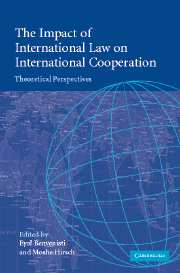Book contents
- Frontmatter
- Contents
- List of contributors
- Acknowledgments
- List of abbreviations
- 1 Introduction
- 2 International law and international relations theory: a prospectus
- 3 Pathways to international cooperation
- 4 Customary international law as a judicial tool for promoting efficiency
- 5 Reputation, compliance and development
- 6 Rethinking compliance with international law
- 7 Compliance with international norms in the age of globalization: two theoretical perspectives
- 8 Compliance and non-compliance with international norms in territorial disputes: the Latin American record of arbitrations
- 9 International trade and domestic politics: the domestic sources of international trade agreements and institutions
- 10 Human rights, developing countries and the WTO constraint: the very thing that makes you rich makes me poor?
- 11 Back to court after Shrimp–Turtle: India's challenge to labor and environmental linkages in the EC generalized system of preferences
- Index
8 - Compliance and non-compliance with international norms in territorial disputes: the Latin American record of arbitrations
Published online by Cambridge University Press: 06 July 2009
- Frontmatter
- Contents
- List of contributors
- Acknowledgments
- List of abbreviations
- 1 Introduction
- 2 International law and international relations theory: a prospectus
- 3 Pathways to international cooperation
- 4 Customary international law as a judicial tool for promoting efficiency
- 5 Reputation, compliance and development
- 6 Rethinking compliance with international law
- 7 Compliance with international norms in the age of globalization: two theoretical perspectives
- 8 Compliance and non-compliance with international norms in territorial disputes: the Latin American record of arbitrations
- 9 International trade and domestic politics: the domestic sources of international trade agreements and institutions
- 10 Human rights, developing countries and the WTO constraint: the very thing that makes you rich makes me poor?
- 11 Back to court after Shrimp–Turtle: India's challenge to labor and environmental linkages in the EC generalized system of preferences
- Index
Summary
Introduction
Why do states comply with international norms related to territorial disputes, such as pacta sunt servanda and the peaceful settlement of international disputes? Why and when do states reject adverse arbitration awards and not comply with their previous international commitments (to abide by the ruling)? This chapter attempts to answer these two questions by examining the strange reality of Latin American (especially the South American) international society, and its unique record of recourse to international arbitration to settle international disputes over territory.
Since independence, the Latin American countries have gradually built a sophisticated and highly developed system of regional international law and institutions, including regional norms that have regulated their international and domestic behavior. Among these regional norms are principles of sovereignty and non-intervention, the recognition of former colonial borders, peaceful settlement of international disputes and commitment to political legalism, democracy and human rights. More than any other regional grouping, the Latin American countries have turned to international arbitration to settle their territorial disputes (about twenty-two times in the last part of the nineteenth and throughout the twentieth centuries), and have complied on almost half of the occasions (ten or eleven out of twenty-two). This is a remarkable record in relative (comparative) terms.
The working assumption of any functional international society with “normal” international relations is that of compliance. Thus, international lawyers assume that “almost all nations observe almost all principles of international law and almost all of their obligations almost all of the time.”
- Type
- Chapter
- Information
- The Impact of International Law on International CooperationTheoretical Perspectives, pp. 194 - 215Publisher: Cambridge University PressPrint publication year: 2004
- 2
- Cited by



